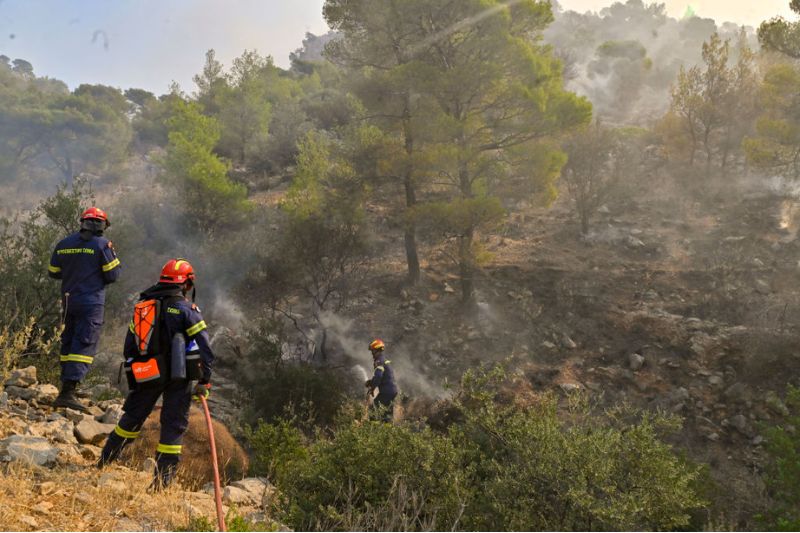I’m good in the heat: I’m used to it. So I tell myself whenever my computer registers 41 degrees, as it has just now. The reason I’m good in the heat (I tell myself again) is that I spent several formative years in the Wimmera district of Victoria, where the land is as flat as a pancake and the summer skies are endless. The wheat fields are endless, too, or they used to be, and are punctuated by silos that stick up like little fingers through the shimmering heat.

I was seven when we arrived in the township. The Overland train had delivered us at three o’clock on that January morning, and six hours later we were lugging our suitcases the four blocks to our house. The flowering gums were bright red, and the cicadas were deafening. And it was definitely hot. It remained so: when my sister and I were at school, Mum would shut the house up and do the housework in her underwear. In the evening all the windows and doors were open while Dad watered the garden; we three sang around the piano while another hot day gasped to its close.
So the Peloponnesian summer held no fears for me. The English roses of my acquaintance wilted in darkened rooms while I carried on regardless: I hate the cold. But how I remember the record-breaking heat wave of 1987, which occurred in the last 12 days of July. The mercury stood at 40 plus every day, and the top temperature was 47C. 1300 people died in Greece: I attended three village funerals and should have attended a fourth, for my poor neighbour had woken up one morning to find her husband dead on the bedroom floor.
My parents were visiting. Predictably, my mother coped well, but my father lay all day on the couch, wearing only his bathers and a wet face washer on his head. From time to time he moaned gently, and he never forgot what he called the Daddy of all heat waves. He is not around now to observe what southern Europe is going through at present. Extreme heat and tinder-dry vegetation become very dangerous when winds start to rise, and this pattern has already prevailed in a number of places.
The current conditions started last Wednesday, and it is not really known when they will change, although meteorologists are making noises about 16 days or more. Authorities are worried and wary, for during last summer 62000 people died in European heat waves. The Acropolis and other famous archaeological sites are closed from 12 noon to 5.30pm, so concerned are the medical experts. The Hellenic Red Cross is handing out free bottles of water in Athens, and this practice is also taking place here in Kalamata, a sight I have never seen before.
'The current conditions started last Wednesday, and it is not really known when they will change, although meteorologists are making noises about 16 days or more. Authorities are worried and wary, for during last summer 62000 people died in European heat waves.'
And then there are the fires. (I may be good in the heat, but just the thought of fire unnerves me, to say the least, as I cannot forget the orange wall of flame that was heading towards the village in 2007.) My youngest son is a fire-fighter, so the summer is always freighted with personal worry. Sure enough, he has already spent all of one night up a mountain in the Corinth area, but so far our province of Messenia is not threatened.
It’s a different story, however, on the tourist island of Rhodes, where fires have been burning for five days, and are now deemed to be out of control. It is not surprising to learn that a state of emergency has been declared. It is reported that three hotels have burned down, while a record 19000 people have been evacuated from homes and holiday residences, some by boat. Once again the Greek public has risen to meet a dire situation: last night at least one lot of evacuees arrived at emergency accommodation in a school to find food, water, medical supplies and sleeping bags readily available, and it is gratifying to note that many rescued tourists have taken to social media in order to express their appreciation of such gestures.
Greek fire-fighters are under great strain, as 62 fires broke out in a mere 24 hour period recently. They are, however, being helped by many foreign fire personnel who have come to the rescue from as far away as Poland, Cyprus, Turkey and Canada. Another effort that is also appreciated.
But when will this fraught period end? For now the island of Corfu is alight.
Gillian Bouras is an expatriate Australian writer who has written several books, stories and articles, many of them dealing with her experiences as an Australian woman in Greece.
Main image: Firefighters try to extinguish a wildfire burning near the village Kandili near Athens on July 19, 2023 in Athens, Greece. (Milos Bicanski/Getty Images)